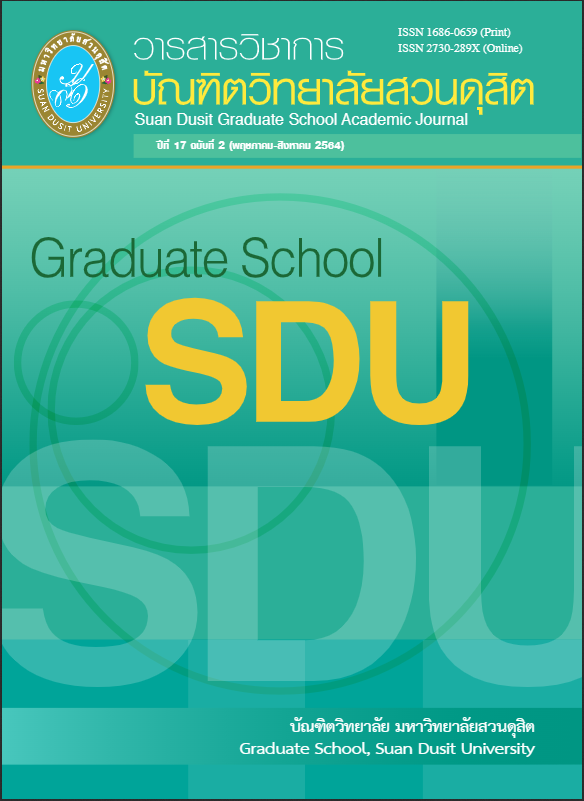ปัจจัยที่มีความสัมพันธ์กับความตั้งใจที่จะเป็นผู้ประกอบการของนักศึกษาคณะบริหารธุรกิจและศิลปศาสตร์ มหาวิทยาลัยเทคโนโลยีราชมงคลล้านนา เชียงใหม่
คำสำคัญ:
เจตคติต่อการเป็นผู้ประกอบการ, บรรทัดฐานทางสังคม, การรับรู้สมรรถภาพแห่งตน, ความตั้งใจที่จะเป็นผู้ประกอบการบทคัดย่อ
การวิจัยนี้มีวัตถุประสงค์เพื่อศึกษา 1) ระดับความคิดเห็นในเจตคติต่อการเป็นผู้ประกอบการบรรทัดฐานทางสังคม การรับรู้สมรรถภาพแห่งตน และความตั้งใจที่จะเป็นผู้ประกอบการของนักศึกษาคณะบริหารธุรกิจและศิลปศาสตร์ มหาวิทยาลัยเทคโนโลยีราชมงคลล้านนา เชียงใหม่ 2) ปัจจัยที่มีความสัมพันธ์กับความตั้งใจที่จะเป็นผู้ประกอบการของนักศึกษาคณะบริหารธุรกิจและศิลปศาสตร์ มหาวิทยาลัยเทคโนโลยีราชมงคลล้านนา เชียงใหม่ โดยเก็บข้อมูลจากกลุ่มตัวอย่างจำนวน 230 คน ด้วยวิธีการสุ่มตัวอย่างแบบแบ่ง ชั้นตามสัดส่วนโดยการคำนวณเทียบสัดส่วนจำนวนประชากรในชั้นปีสุดท้ายของแต่ละแผนก และใช้แบบสอบถามที่มีค่าระดับความเชื่อมั่น (∝) ที่ 0.856 เป็นเครื่องมือในการเก็บรวบรวมข้อมูลและใช้สถิติในการวิเคราะห์ข้อมูล ได้แก่ ความถี่ร้อยละ ส่วนเบี่ยงเบนมาตรฐาน และค่าสัมประสิทธิ์สหสัมพันธ์ของเพียร์สันผลการศึกษาพบว่า 1) กลุ่มตัวอย่างมีความคิดเห็นในภาพรวมเกี่ยวกับเจตคติต่อการเป็นผู้ประกอบการบรรทัดฐานทางสังคม และการรับรู้สมรรถภาพแห่งตนอยู่ในระดับมาก (ค่าเฉลี่ยรวม = 3.93 3.65 และ 3.45) ตามลำดับ ส่วนความคิดเห็นในภาพรวมเกี่ยวกับความตั้งใจที่จะเป็นผู้ประกอบการอยู่ในระดับปานกลาง(ค่าเฉลี่ยรวม = 3.17) 2) ปัจจัยทั้งสามมีความสัมพันธ์กับความตั้งใจที่จะเป็นผู้ประกอบการอย่างมีนัยสำคัญ (p<0.01) โดยบรรทัดฐานทางสังคมมีความสัมพันธ์กับความตั้งใจที่จะเป็นผู้ประกอบการสูงสุด (r = 0.495)รองลงมา คือ เจตคติต่อการเป็นผู้ประกอบการ (r = 0.299) และสุดท้ายคือการรับรู้สมรรถภาพแห่งตน (r = 0.025) ซึ่งปัจจัยทั้งหมดมีความสัมพันธ์ทางบวกกับความตั้งใจที่จะเป็นผู้ประกอบการ โดยมีความสอดคล้องและเป็นไปในทิศทางเดียวกันกับสมมติฐานที่กำหนด
เอกสารอ้างอิง
Bandura, A. (1997). Social Cognitive Development: Frontiers and Possible Futures. Cambridge: Cambridge University.
Carsrud, A. L. & Krueger, N. F. (2010). Entrepreneurial Intentions: Applying the Theory of Planned Behavior. Entrepreneurship & Regional Development, 5 (4): 315-330.
Ferreira, J. J., Raposo, M. L., Gouveia Rodrigues, R., Dinis, A. & do Paco, A. (2012). A Model of Entrepreneurial Intention: An Application of the Psychological and Behavioral Approaches. Journal of Small Business and Enterprise Development, 19 (3): 424-440.
Gurel, E., Altinay, L. & Daniele, R. (2010). Tourism Students' Entrepreneurial Intentions. Annals of Tourism Research, 37 (3): 646-669.
Heuer, A. & Linan, F. (2013). Testing Alternative Measures of Subjective Norms in Entrepreneurial Intention Models. International Journal of Entrepreneurship and Small Business, 19 (1): 35-50.
Krueger, N. F., Reilly, M. D. & Carsrud, A. L. (2000). Competing Models of Entrepreneurial Intentions. Journal of Business Venturing, 15 (5): 411-432.
Leelathum, M. (2018). Inspirational Business. [Online]. Available: http://www.bangkeknews/bangkokbiznews.com. [2018, September 281.
Linan, F. & Chen, Y. W. (2009). Development and Cross-cultural Application of A Specific Instrument to Measure Entrepreneurial Intentions. Entrepreneurship Theory and Practice, 33 (3): 593-617.
Linan, F. & Rodriguez-Cohard, J. C. (2015). Assessing the Stability of Graduates' Entrepreneurial Intention and Exploring Its Predictive Capacity. Academia Revista Latinoamericana de Administration, 28 (1): 77-98.
Linan, F., Nabi, G. & Krueger, N. (2013). British and Spanish Entrepreneurial Intentions: A Com-parative Study. Revista de Economia Mundial, 33: 73-103.
Lohawattanakul, S. (2018). Re-Investing SME Future. [Online]. Available: https://bangkok-today.com/web. [2018, September 8].
Mekara, M. (2003). Factors Predicting Entrepreneurial Intentions of Chiang Mai University Students. Independent Study: Master of Science (Industrial and Organization Psychology), Graduate School Chiang Mai University.
Moungmee, P. (2012). Psycho-social Factors Associated with Entrepreneurial Intention of the Fourth Year Thammasat University Students. Journal of Behavioral Science for Development, 4 (1): 74-82.
Nithikitsookkasem, P. & Wingwon, B. (2018). Model Entrepreneurial Intentions of Students Vocational in Education for Enterprise Incubator Project. Journal of Business Administration The Association of Private Higher Education Institutions of Thailand, 7 (1): 146-147.
Ogundipe, S. E., Kosile, B. A., Olaleye, V. I. & Ogundipe, L. O. (2012). Entrepreneurial Intention Among Business and Counselling Students in Lagos State University Sandwich Programme. Journal of Education and Practice, 3 (14): 64-72.
Triprobsakul, S. (2015). The Study of Entrepreneurship Motivation on Business Growth and Business Growth Expectation: A Case Study of Thailand. Suthiparithat Journal, 29 (90): 75-93.
Triprobsakul, S. & Pichyangkul, C. (2018). Factors Influencing Youth Entrepreneurs in Thailand. NIDA Business Journal, (22): 44.
Waiwanichayakul, N. & Udomsri, C. (2005). Research Methodology in Business. Bangkok: Chulalongkorn University.
Yensawadsdi, W. (n.d.). Ten Attributes of The Best Entrepreneurs. [Online]. Available: https://www.Softbankthai.com/Article/Detail/863. [2017, May 17].
Yothongyos, M. & Sukmaungma, S. (2016). Factors Affecting Entrepreneurial Intention of Undergrad Students: A Case Study of Bangkok University. Suthiparithat Journal, 30 (95): 104.
ดาวน์โหลด
เผยแพร่แล้ว
รูปแบบการอ้างอิง
ฉบับ
ประเภทบทความ
สัญญาอนุญาต
ลิขสิทธิ์ (c) 2021 วารสารวิชาการบัณฑิตวิทยาลัย สวนดุสิต

อนุญาตภายใต้เงื่อนไข Creative Commons Attribution-NonCommercial-NoDerivatives 4.0 International License.






